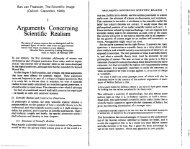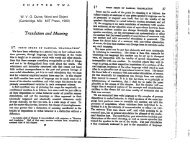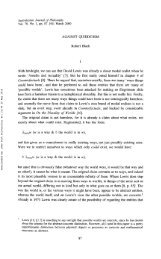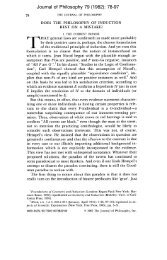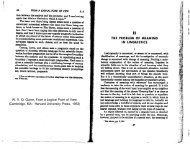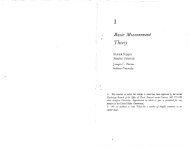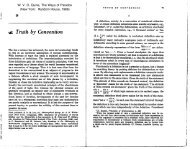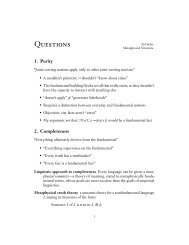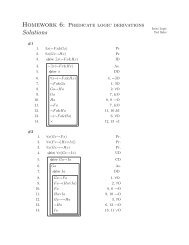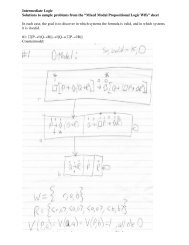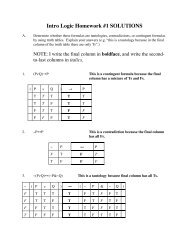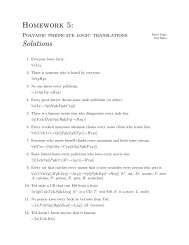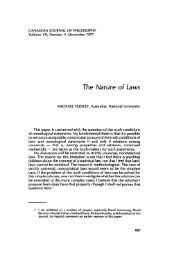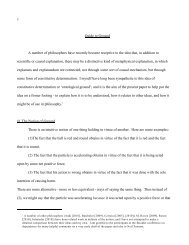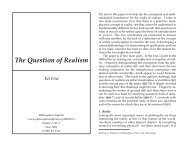Dummett - Wittgenstein's Philosophy of Mathematics.pdf - Ted Sider
Dummett - Wittgenstein's Philosophy of Mathematics.pdf - Ted Sider
Dummett - Wittgenstein's Philosophy of Mathematics.pdf - Ted Sider
Create successful ePaper yourself
Turn your PDF publications into a flip-book with our unique Google optimized e-Paper software.
MICHAEL DUMMETT<br />
means: there is something such that if we knew <strong>of</strong> it we should<br />
regard it as a criterion (or at least as a ground) for asserting<br />
the statement. The essence <strong>of</strong> realism is this: for any statement<br />
which has a definite sense, there must be something in virtue<br />
<strong>of</strong> which either it or its negation is true. (Realism about the<br />
realm <strong>of</strong> mathematics is what we call Platonism.) Intuitionists<br />
do not at all deny the first thesis; for them one is justified in<br />
asserting a disjunction only when one has a method for arriving<br />
at something which would justify the assertion <strong>of</strong> some one<br />
particular limb <strong>of</strong> the disjunction. Rather, they deny the second<br />
thesis: there is no reason for supposing in general that, just<br />
because a statement has a quite definite use, there must be<br />
something in virtue <strong>of</strong> which either it is true or it is false. One<br />
must beware <strong>of</strong> saying that logical truths are an exception, that<br />
there is nothing in virtue <strong>of</strong> which they are true; on the contrary,<br />
for the realist we are justified in asserting rP or not P1 because<br />
there must be something in virtue <strong>of</strong> which either P or rNot P'<br />
is true, and hence in any case there must be something in virtue<br />
<strong>of</strong> which rp or not P1 is true.<br />
Now there seems here to be one <strong>of</strong> the big differences between<br />
Wittgenstein and the intuitionists. He appears to hold that it<br />
is up to us to decide to regard any statement we happen to pick<br />
on as holding necessarily, if we choose to do so.7 The idea behind<br />
this appears to be that, by laying down that something is to<br />
be regarded as holding necessarily, we thereby in part determine<br />
the sense <strong>of</strong> the words it contains; since we have the right to<br />
attach what sense we choose to the words we employ, we have<br />
the right to lay down as necessary any statement we choose to<br />
regard as such. Against this one would like to say that the senses<br />
<strong>of</strong> the words in the statement may have already been fully<br />
determined, so that there is no room for any further determina-<br />
tion. Thus, if one takes a classical (realist) view, the general<br />
form <strong>of</strong> explanation <strong>of</strong> the sense <strong>of</strong> a statement consists in the<br />
stipulation <strong>of</strong> its truth-conditions (this is the view taken by<br />
Wittgenstein in the Tractatus and also the view <strong>of</strong> Frege). Thus<br />
the sense <strong>of</strong> the sentential operators is to be explained by means<br />
7Cf. V, 23, last par. on p. I79.<br />
336



